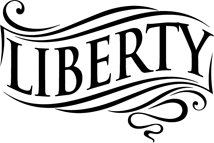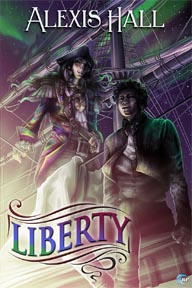There Will Be Phlogiston (35 page)
Read There Will Be Phlogiston Online
Authors: Riptide Publishing
Tags: #adventure, #action, #monster, #victorian, #steampunk, #multiple partners, #historical fantasy, #circus, #gaslight culture
“Sometimes. But I cry for other reasons as well.
Over art, or because the world is beautiful, or occasionally even
in pleasure. I find it hard to account it any sort of sin.”
Perhaps because it had been a long time since
someone had spoken to me as if I was their equal, and looked at me
as though I was more than a problem to be solved or a misshape to
be realigned, I blurted out, “I think I’m full of sins.”
He smiled at me, very gently, and took a seat on the
bench. I’m sure you can imagine how Ruben looked in the rose garden
by moonlight.
Mighty dimber, I reckon. You ever feel more than
friendly towards him yourself?
Strangely enough, no, though he’s a good man, and I
love him dearly. There’s very little I wouldn’t do for him.
Aye, figured that when you took up with some prissy
motherswinker what he fancied.
Do you miss him very much?
Ol’ Milord? Like I miss crabs.
Not Milord. Ruben.
Y’know, I thought I would. I mean, I do. But you
don’t begrudge a fella you care about getting what he wants.
Even if it means you don’t get what you want?
I used to think wanting was the inevitable
consequence of not having. And Ruben was like the . . . the . .
.
apotheosis
of having, to say nowt of being hot as mustard
in the sack. But, truth is, wanting ain’t so simple a business, and
I ain’t the same as what I used to be.
Dil, I—
Finish the story, eh? I’m kinda enjoying imagining
Ruben with the roses.
As you wish.
“What sort of sins, dear-heart?” he wanted to
know.
His voice was velvet-soft, and his eyes steady on
mine. He was so full of impossible certainties about himself and
about the world, and I wanted so much to believe in him, this man
who made weakness seem like strength. I told him everything. A
garbled mess, I’m sure, for much of what I had managed to put
together about the circumstances of my birth and childhood I didn’t
understand until later. But I spoke of my father, and Captain
Rackham, and myself: all the ways I was strange, and wrong, and not
what I was supposed to be. And everything I knew I shouldn’t want,
but did, and could not stop myself from wanting. How I wanted to
dance in a beautiful dress, and be held in a man’s arms.
“I don’t know what I am,” I finished, breathless and
half-sick on confession, like the burn of a freshly lanced
wound.
“You’re you.” He made it sound so very simple.
Perhaps in another context it would be. It had on the
Valiant
. “And there’s certainly no wrong in preferring men
as other men do women.”
“It . . . it is not common. And . . .” I recalled
Claverslick’s switch “. . . I think neither moral nor
biblical.”
“It is my own preference, and I believe the Bible,
like any other book, is subject to interpretation.”
I gasped. “Is that not heresy?”
“Some might—” he frowned “—some have thought so. I’m
sorry, I meant to comfort you, not to frighten you.”
“I don’t think I’m frightened.” How could I be, in
the company of a man who would risk his own secrets to soothe a
stranger’s fears? “But what do you mean?”
“Well, our understanding of anything is shaped by
its context: to draw literalities from a text that—however divine
its inspiration—is ultimately historical, is not just foolish but
harmful.” His hand moved absently to touch the collar of his shirt.
“The Bible tells us both ‘Thou shalt love thy neighbour as thyself’
and ‘Thou shalt not sow thy field with mingled seed.’ It is
perverse to pretend both passages are equally pertinent to modern
life. For a start, I don’t have a field.”
I laughed, and it had been so long that the sound of
it surprised me. I must have lost the habit, because afterwards I
had to catch my breath, and my mouth still tasted salty from my
tears. “I do not believe in this Western god.” It felt wildly good
to say it. It was a truth that travelled the length of my spine.
Made me taller. As if, at last, I inhabited myself again. “In the
land where I was born, there existed many beliefs and philosophies.
Here there is only one, and it cares nothing for what is good, or
what is true, or what is beautiful. It only cares to enforce what
it thinks to be right, and crush all it thinks to be wrong.”
Ruben’s eyes had gone a little wide, but he only
said, “In which case, I am not sure I believe in this Western god,
either.”
“But are you not a Christian?”
“Oh yes. But whatever you might have been taught,
that does not mean one thing. Or always the same thing. A god who
exists to condemn and control, who debases love, rather than exalts
it?” His smile was back, and the crinkles, and the deep brackets
around his mouth. “Why would I worship him?”
I thought of fire and dark places. The switch
against my skin. “Fear of punishment?”
He was silent a moment. “You’ve studied Machiavelli,
haven’t you?”
I nodded. It had not engaged me, being full of war
and bombast.
“You recall what he wrote about fear and love?”
Of course I recalled. I had learned my lessons well,
having little choice in the matter. “He said ideally one should be
both, but as it is hard to unite them in a single individual, it is
safer to be feared.”
“Yes. Exactly.” His approval warmed me like the too
rarely seen sun. “Fear is a tight yoke. And love is a thread as
slender as a single hair that can stretch across the whole
world.”
I offered him a smile. “I don’t think he put it
quite like that.”
“No, but it captures the sentiment. A sentiment
which, in any case, I believe to be wrong. Fear is a poor way to
motivate anyone.”
“For the motivated, perhaps, but it offers
consistent behaviour.”
Ruben’s hand curled into a fist on the bench between
us. “Ah, but it doesn’t. Fear makes people unpredictable. Whereas
love . . .”
“Is surely equally unpredictable? And Machiavelli
would claim considerably more fragile a bond.”
“Perhaps, but I believe there are things we do for
love far beyond anything fear could demand.”
His conviction was, in itself, rather captivating.
But I was disinclined to accept something simply because I liked
the idea of it. “You have seen this?”
He threw back his head and laughed, such a rich,
heedless sound. “I’m a priest. Believing in things you haven’t seen
is part of the job description.”
“You’re a priest?” I couldn’t keep the astonishment
from my voice. He neither looked, nor spoke, nor acted like
one.
A momentary hesitation. “Well, I was. I mean, I
still am. I’m not sure it’s a thing you just stop being. But I
can’t . . . I can’t preach anymore.”
I saw it then, the grief in him. “I’m sorry.”
“Thank you, but I don’t need church-sanctioned words
to be of use to the world, do I? To do something good. Something
that matters.”
He hunched forward, chin in his palm, intent and at
the same time strangely vulnerable—this naked need in him to live
according to his beliefs. It made me feel tender towards him, not
just for the time he had taken to comfort me, or for his truths and
his kindness, but because it seemed a dangerous thing to me, his
conviction of benevolence—divine or otherwise—at the heart of the
world.
“You did something good tonight,” I told him.
“Oh, nonsense, I just—”
But he was interrupted by footsteps and the click of
a cane upon the terrace. “Ruben? Are you lurking out here?”
I gasped and tried to pull myself deeper into the
shadows.
Ruben put a finger to his lips, and then stood. “I’m
not lurking, father. I’m taking the air.”
“Well, stop taking it. I want you to dance with the
Wolfram girl.”
“I’ll gladly dance with her, my lord, but I won’t
marry her.”
Lord Iron, who I could not see, made a frustrated
noise. “I indulged your last fancy. I will not indulge this
one.”
“Believe me—” Ruben sighed “—the reason I am
unsuited to matrimony is far from fancy.” He leaned down and
pressed a kiss to my brow, and then slid his mouth to my ear, all
warm breath, rough lips, as he whispered, “I hope you find your
dance.”
I watched him as he walked away and vanished into
the light.
Skies?
Visit
riptidepublishing.com/titles/cloudy
SNEAK PEEK: LIBERTY

The wars of the future will be fought not by men on
horseback, not with lances or with cannon or with ships, but with
weapons fashioned from the very stuff of creation.
Scholars of military and international history have
long held the destruction of the British Empire’s 4th Skyfleet
above the pirate town of Liberty in 1866 to be the first recorded
use of modern aetherweaponry and to constitute a turning point in
international and interdimensional politics.
The pertinent documents, declassified in 1958 and
compiled here in a new edition, are not only an invaluable resource
for the interested amateur, but also a fascinating tale in their
own right, revealing as they do the story of Captain George
England’s hitherto secret work for the Aethermantic Operations
Executive, his infiltration of the now legendary aethership
Shadowless
, and his final confrontation with the
historically controversial pioneer of militarised aethermancy,
Samuel Hardinge.
In these times of social unrest and multiversal
upheaval, the events of 1866 have a new relevance, and it is our
hope that the modern reader will find this narrative as pertinent
as it would have been a hundred and fifty years ago.

Ebook: ISBN: 978-1-62649-228-8
riptidepublishing.com/titles/liberty

The following collection of documents details, as
best this council can manage, the events surrounding the incident
of 17 March 1866, which destroyed the 4th Skyfleet, nearly
precipitated war with Prussia, and led to the official dissolution
of the Aethermantic Operations Executive.
These documents have been declassified as part of a
thorough review of National Intelligence Policy following the
introduction of the Public Records Act, the Aetheric Services Act,
and the International Convention on the Uses of Telepathy.
Many of the security implications of these papers
have ceased to be pertinent in the wake of the Martian
invasion.
Dame Esmeralda Hawthorne
Permanent Secretary, Home Office
12 July 1958
